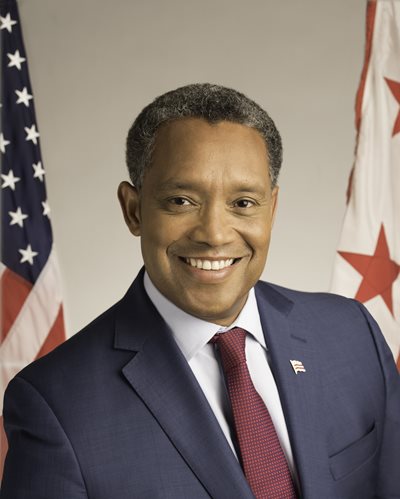Racine Addresses Violence Against Asian American Community in Rauh Lecture
March 19, 2021
The recent Atlanta spa shootings were top of mind when D.C. Attorney General Karl A. Racine delivered the 28th annual Joseph L. Rauh Lecture on March 17 to more than 100 attendees of the virtual event.
“We are seeing an unprecedented rise in hate crimes directed at our Asian American Pacific Islander brothers and sisters,” Racine said. “Let me also emphasize that a lot of the hate that we’re seeing nationally has intersectionality to it — most of the hate that we see also falls on women more directly and more harshly.” Racine cited “incels” (involuntary celibates) as a hate group of “white extremist, violent men who blame their state of mind on the fact that women refuse to sleep with them.”
“This is the kind of outrageous hate growth that we’ve seen, to be very honest, rise dramatically since 2015. That's why it’s so important that we have a better tone at the top of the United States government,” Racine said. He added that the D.C. Office of the Attorney General (OAG) is helping to lead nationwide efforts toward combatting hate inflicted on minority communities.
 As an immigrant from Haiti, Racine mentioned the significance of fighting on behalf of other immigrants. “What we have to do is educate people about the truth of our history so that we can have a reckoning about it. And then we have to go about calling it out for what it is.”
As an immigrant from Haiti, Racine mentioned the significance of fighting on behalf of other immigrants. “What we have to do is educate people about the truth of our history so that we can have a reckoning about it. And then we have to go about calling it out for what it is.”
Racine went on to explain the twofold function of the OAG: representing the District and its agencies in court and advancing the public interest, especially regarding the city’s affordable housing crisis, workers’ rights, and juvenile justice.
The OAG has filed lawsuits against numerous slumlords to better protect tenants living in substandard housing conditions in the District. “Let’s be really, really blunt about this. The District of Columbia has experienced not only an influx of people who want to live in our great city, but also the most intense displacement of District residents, overwhelmingly Black, brown, and lower-income people, as a result of these types of policies,” Racine said. “One of my favorite cases is [one] we brought against the city’s largest slumlord. In that case, every tenant received a minimum of $11,500. They received the right to stay in their building; they received the right to have their building fully serviced as expected. And lastly, we made sure that that slumlord ceased doing business in the District of Columbia for seven years.”
Racine cited the construction industry as an example of how the OAG is advocating for workers’ rights in the District. He argued that many construction contractors bid competitively for opportunities to work on developments, with the intent of paying construction workers at rates below the legal requirements. And oftentimes those construction workers are vulnerable immigrants and low-income residents who seldom complain. “That's why our workers’ rights group has been absolutely tenacious — suit after suit — at seeking to hold the industry, the construction industry in particular, accountable for wage theft,” he said.
On the issue of juvenile justice reform, Racine said the OAG has ramped up its diversion and restorative justice efforts. “We know that bringing kids into the criminal justice system, though necessary for the most serious offenses, does have a way of creating, unfortunately, a cycle of involvement in the system. And through restorative justice as well as through diversion, we are proving that not only are those programs successful, [but they also] enhance public safety,” he said.
After the lecture, Racine fielded questions from attendees, including whether rioters who stormed the Capitol on January 6 will be charged with violating any specific D.C. laws.
“The Office of the Attorney General immediately focused on identifying the misdemeanor offenses that we had jurisdiction over,” Racine explained. “So, let me tell you what they are —things like violation of curfew. And you might remember that on January 6, a 6 p.m. curfew was mandated, and there were a lot of folks who violated that curfew. We have misdemeanor jurisdiction for the prosecution of possession of an unregistered firearm and possession of unregistered ammunition, both of which we've got evidence of. And people have been arrested for those offenses. And then most interestingly, on the criminal side, the Office of the Attorney General has misdemeanor authority for an offense called inciting violence.”
“We need to work with the U.S. Attorney's Office because the last thing we want to do is bring misdemeanor cases that would interfere with and perhaps trigger double jeopardy ramifications of felonies that the federal prosecutor might bring. So, I'm happy to tell you that we're working closely with the acting U.S. attorney [for the District], Channing Phillips, on those matters,” Racine added.
The Rauh Lecture is an annual event presented by the University of the District of Columbia (UDC) David A. Clarke School of Law in honor of Rauh, a civil rights and civil liberties lawyer who championed public interest law. Past lecturers have included Supreme Court Justices Ruth Bader Ginsburg and Sonia Sotomayor, Representative John Lewis, and former U.S. Attorney General Eric Holder.
Racine praised UDC as “the best clinical law school in the country,” adding that the OAG benefits every year “when we're able to employ UDC law students in our summer program, as we do our fellowship program, and then as lawyers.”





